
Prof. Dr. Markus Ralser

Charité – Universitätsmedizin Berlin
Institut für Biochemie
Charitéplatz 1
10117 Berlin
Phone: +49 (30) 450-528 921
E-mail: markus.ralser@charite.de
Biochemistry
- Department of Biochemistry, Charité – Universitätsmedizin Berlin, Germany;
- The Wellcome Centre for Human Genetics, Nuffield Department of Medicine, University of Oxford, UK;
- Max Planck Institute for Molecular Genetics, Berlin, Germany
2023 - IUBMB Plenary lecture award, Biochemical Society of Canada
2021 – 2027 - European Research Council (ERC, 2 PIs) Synergy grant “Fungal Tolerance"
2021 - EMBO, elected member
2020 - 2026 - National Research Node for Mass Spectrometry (Co-Coordinator, BMBF)
2020 - The EMBO Gold medal
2019 - The Starling Medal, The Endocrinology Society, UK
2017 - The Colworth Medal, The Biochemical Society, UK
2016 - Investigator Award in the Life Sciences, The Wellcome Trust
2014 - South-Tyrolean Science Price, Bolzano, Italy
2012 - 2018 - Research Associate Fellowship, St John’s College, Cambridge, UK 2012 European Molecular Biology organisation (EMBO) Young Investigator 2011-2016 European Research Council (ERC) starting grant
2011 - Wellcome-Beit Prize
2011 - 2016 - Wellcome Trust Research Career development fellowship
2008 - BioMed Central Research Award, Biology
University training and degree
2003 - Graduation (‘Diploma, (M.Sc), in Genetics and Molecular Biology, University of Salzburg. mit Auszeichnung’ (highest distinction for Master degree)
1999 - 2002 Undergraduate education, Paris Lodron University of Salzburg in Biology Genetics, Molecular Biology & Applied Informatics
1999 - Degree to “perito agrario” (eq. engineer, Ing.), Auer, Italy
Advanced academic qualifications
2006 PhD degree natural sciences (Dr. rer. nat.) ‘mit Auszeichnung’ Max Planck Institute for Molecular Genetics, and University of Salzburg, Austria “On the neurodegenerative disorder Spinocerebellar Ataxia Type 2”.
Postgraduate professional career
2018 - present - Einstein Professor of Biochemistry, Head of Biochemistry Charité
2013 - present - Group leader, The Francis Crick Institute, London, UK
2011 - 2018 - Principal Investigator and Wellcome Beit Prize fellow, Dept. of Biochemistry and Cambridge Systems Biology Centre, University of Cambridge, UK
2007 - 2011 - Head of junior research group ‘Molecular Biology of Metabolism’ and quantitative mass spectrometry, Max Planck Institute for Molecular Genetics, Berlin, Germany
2009 - Visiting Scientist, Clinical Metabolomics Lab, Dept of Clinical Chemistry, VU University Amsterdam
2023 VIB center for microbiology, Belgium
2021 – 2023 Novo Nordisk Foundation, Denmark, NNF Data Science Committee, in the panels for emerging, ascending and distinguished awards as well as infrastructure grants
2021 – 2023 Foundation for Science and Technology (FCT) Portugal; Committee for Data Science
2017 – 2020 Fundação para a Ciência e a Tecnologia, Portugal, participation in several national grant panels
2016 – 2019 Independent Research Fund, Denmark, member of the national grant panel (Biochemistry and Experimental Biology)
2018 HCRES Scientific Review Board, Institute Jacques Monod, Paris France
Most important publications
- Messner, C. B., Demichev, V., Muenzner, J., Aulakh, S. K., Barthel, N., Röhl, A., Herrera- Domínguez, L., Egger, A.-S., Kamrad, S., Hou, J., Tan, G., Lemke, O., Calvani, E., Szyrwiel, L., Mülleder, M., Lilley, K. S., Boone, C., Kustatscher, G. & Ralser, M. The proteomic landscape of genome-wide genetic perturbations. Cell 186, 2018-2034.e2021 (2023). DOI: 10.1016/j.cell.2023.03.026
- Correia-Melo, C., Kamrad, S., Tengölics, R., Messner, C. B., Trebulle, P., Townsend, S., Jayasree Varma, S., Freiwald, A., Heineike, B. M., Campbell, K., Herrera-Dominguez, L., Kaur Aulakh, S., Szyrwiel, L., Yu, J. S. L., Zelezniak, A., Demichev, V., Mülleder, M., Papp, B., Alam, M. T. & Ralser, M. Cell-cell metabolite exchange creates a pro-survival metabolic environment that extends lifespan. Cell 186, 63-79.e21 (2023). DOI: 10.1016/j.cell.2022.12.007
- Kamrad, S., Correia-Melo, C., Szyrwiel, L., Aulakh, S. K., Bähler, J., Demichev, V., Mülleder, M. & Ralser, M. Metabolic heterogeneity and cross-feeding within isogenic yeast populations captured by DILAC. Nature Microbiology 8, 441-454 (2023). https://doi.org/10.1038/s41564- 022-01304-8
- Yu, J. S. L., Correia-Melo, C., Zorrilla, F., Herrera Dominguez, L., Wu, M. Y., Hartl, J., Campbell, K., Blasche, S., Kreidl, M., Egger, A.-S., Messner, C. B., Demichev, V., Freiwald, A., Mülleder, M., Howell, M., Berman, J., Patil, K. R., Alam, M. T. & Ralser, M. Microbial communities form rich extracellular metabolomes that foster metabolic interactions and promote drug tolerance. Nature Microbiology 7, 542-555 (2022). https://doi.org/10.1038/s41564-022-01072-5
- Messner, C. B., Demichev, V., Bloomfield, N., Yu, J. S. L., White, M., Kreidl, M., Egger, A.-S., Freiwald, A., Ivosev, G., Wasim, F., Zelezniak, A., Jürgens, L., Suttorp, N., Sander, L. E., Kurth, F., Lilley, K. S., Mülleder, M., Tate, S. & Ralser, M. Ultra-fast proteomics with Scanning SWATH. Nature Biotechnology 39, 846-854 (2021). https://doi.org/10.1038/s41587-021-00860-4
- Vowinckel, J., Hartl, J., Marx, H., Kerick, M., Runggatscher, K., Keller, M. A., Mülleder, M., Day, J., Weber, M., Rinnerthaler, M., Yu, J. S. L., Aulakh, S. K., Lehmann, A., Mattanovich, D., Timmermann, B., Zhang, N., Dunn, C. D., MacRae, J. I., Breitenbach, M. & Ralser, M. The metabolic growth limitations of petite cells lacking the mitochondrial genome. Nature Metabolism 3, 1521-1535 (2021). https://doi.org/10.1038/s42255-021-00477-6
- Demichev, V., Messner, C. B., Vernardis, S. I., Lilley, K. S. & Ralser, M. DIA-NN: neural networks and interference correction enable deep proteome coverage in high throughput. Nature Methods 17, 41-44 (2020). https://doi.org/10.1038/s41592-019-0638-x
- Olin-Sandoval, V., Yu, J. S. L., Miller-Fleming, L., Alam, M. T., Kamrad, S., Correia-Melo, C., Haas, R., Segal, J., Peña Navarro, D. A., Herrera-Dominguez, L., Méndez-Lucio, O., Vowinckel, J., Mülleder, M. & Ralser, M. Lysine harvesting is an antioxidant strategy and triggers underground polyamine metabolism. Nature 572, 249-253 (2019). https://doi.org/10.1038/s41586-019-1442-6
- Stynen, B., Abd-Rabbo, D., Kowarzyk, J., Miller-Fleming, L., Aulakh, S. K., Garneau, P., Ralser, M. & Michnick, S. W. Changes of Cell Biochemical States Are Revealed in Protein Homomeric Complex Dynamics. (2018). doi: 10.1016/j.cell.2018.09.050
- Mülleder, M., Calvani, E., Alam, M. T., Wang, R. K., Eckerstorfer, F., Zelezniak, A. & Ralser, M. Functional Metabolomics Describes the Yeast Biosynthetic Regulome. Cell 167, 553- 565.e512 (2016). https://doi.org/10.1016/j.cell.2016.09.007
